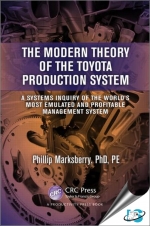Numerous books have been written about Toyota's approach to workplace improvement; however, most describe Toyota's practices as case studies or stories. Designed to aid in the implementation of Lean manufacturing, The Modern Theory of the Toyota Production System: A Systems Inquiry of the World’s Most Emulated and Profitable Management System explains that your organization already has what it takes to succeed with TPS and what’s probably missing is balance.
Bridging the gap between implementation and theory, this text is the first of its kind to use systems theory to study how the pieces of the Toyota Production System (TPS) work together to achieve this much needed balance. Lean practitioners will learn how to use system theory to improve overall decision making when applying Lean or Toyota-like management systems.
Explaining that the glue that holds the pieces of TPS together is just as important as the pieces themselves, the book provides you with invaluable guidance in the implementation of Lean manufacturing from a management perspective. It outlines a blueprint to help you develop a clear understanding of how the pieces of TPS need to come together so you can achieve something greater than what’s possible with the individual pieces.

























